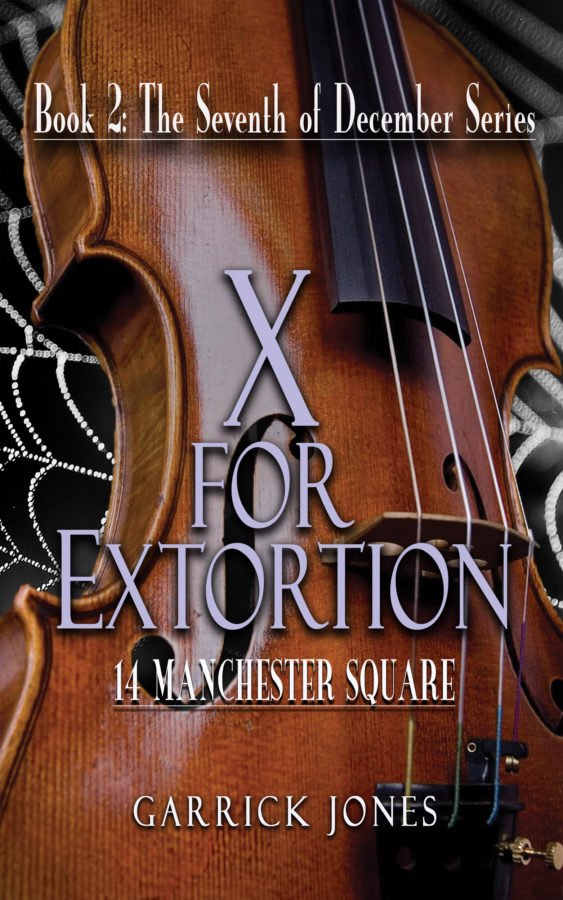14 Manchester Square
by

- The Seventh of December
- X for Extortion
- Farewell, My Boy
- The Perfume of War
“There’s no deal unless you tell me who killed Lucretia, Thomas! For the love of God, I have to know—”
“She was shot by an assassin.”
“But who was this assassin? Who shot her?” he demanded again angrily, leaning forward over the table.
“I did,” I said, after a suitably dramatic pause.
He threw his head back and laughed loudly, his arms crossed on his chest. “You?” he said once he’d regained his breath. “You? Thomas Haupner, the violinist? The would-be army officer from some stupid, derelict relic of the British Empire, a trained assassin?”
After returning from a secret mission in occupied France for His Royal Highness, George, the Duke of Kent, Lieutenant-Colonel Thomas Haupner is looking forward to a cup of tea, a hot bath, and the sleepy head of his American lover, Major Henry Reiter on his shoulder when he wakes up the next morning.
However, along with items Tommy has recovered for the duke, he has also discovered a secret stash of documents, which, when opened, prove to be a poisoned chalice. Tommy and Shorty find themselves caught up in a dangerous web of lies, enemy agents, assassins, and traitors. In an effort to save the reputations of not only their friends, but men and women high in both society and in the government, they themselves become victims of I.K.S., a former World War One international extortion ring, which has risen, phoenix-like, from the ashes of bomb-devastated London.
Publisher: Moshpit Publications
Editors:
Cover Artists:
Genres:
Pairings: M-M
Heat Level: 2
Romantic Content: 1
Ending: Click here to reveal
Character Identities: Gay
Protagonist 1 Age: 26-35
Protagonist 2 Age: 26-35
Tropes: Arranged Pairing, Fated Mates / Soul Mates, In Uniform, True Love
Word Count: 127000
Setting: London, UK, 1941
Series Type: Continuous / Same Characters
That afternoon, around one o’clock, I fell into my office chair and hoisted my legs onto the desk. Even after six months, my left thigh still gave me trouble if I overworked it. Today it was aching right up into my hip.
At the end of our meeting, earlier in the day, we’d decided to reconvene at half past one, and I wanted to spend half an hour before the others arrived, thinking through what we’d discovered since William’s call at the beginning of the day.
Two minutes after I’d pulled a notepad and pencil out of my top drawer, Gladys pushed my door open with no warning, and so violently that I nearly toppled backwards and onto the floor. She pressed her hand to her mouth to hide her amusement.
“Sorry, I’d no idea you were back yet.”
“Where’s the fire, Gladys?”
She gathered a pile of files that were on the armchair next to my desk. “Come downstairs; I have a surprise for you,” she said with a twinkle in her eye.
READ MOREOur premises in Montagu Row occupied two adjoining mews houses. We’d partitioned most of our space into workrooms, meeting rooms and smaller offices, apart from the two-car garage on the ground floor of one of the buildings. Gladys led me down a short corridor, which led into the empty garage.
“Voilà,” she said, flinging the door open. “I had it done after our little tête-à-tête this morning.”
What had been a space for two automobiles was now a comfortable meeting room, its stained concrete floor covered with, what looked like, a second-hand, bomb-damaged carpet.
“All the furniture is courtesy of the WD,” she said proudly, sweeping her hand with the extravagant gesture of a magician’s assistant. “Conference table and chairs for eight, two sofas and three armchairs, cocktail cabinet—sadly empty—and, miracle of miracles, a carton of coffee tins and four pairs of stockings!”
Steve had obviously made good his promise on the coffee.
In front of the lounge furniture, a small, low centre table was already set up with cups and two large plates of sandwiches each covered with a tea towel.
“How on earth did you get two plates of sandwiches? Wait … don’t answer that.”
“One of William’s footmen brought them around.”
“So it’s to be a two-plate sandwich meeting, is it?”
She nodded. It meant that, as co-ordinator of our various information-gathering forays, she knew that we were going to be discussing things for at least a few hours.
I lifted a tea towel to examine the sandwiches and my mouth began to water. Ham and cheese, devilled egg, and chicken with lettuce.
“Don’t ask,” she said. “Despite my irresistible charms, the footman would have none of it, and wouldn’t tell me where William’s cook got the chicken. ‘What you don’t know won’t kill you,’ was his answer.”
“Pity. Let’s assume the ingredients are from his estate in Devon, and that’s why the footman was resistant to your batted eyelashes?”
“I think you might have had more success than I with that tall country boy in his natty uniform.”
“Oh!”
“Yes, oh! In my experience, Colonel, if they’re not married in their mid-twenties, and there’s nothing apparently wrong with them, then all the batted eyelashes in the world from women like me will be for naught.”
We both chuckled.
COLLAPSEI have been on a Garrick Jones kick recently. His painstaking historical research, getting into the minute details of life in whatever period he's writing about, creates an astonishing sense of living in the moment he's depicting - I mean yes, I did not live through the Blitz, but in this book and its predecessor, he brings it to life more compellingly than anything else I've read about that terrifying, bloody, transformative time. I love his fundamentally good, hyper competent characters. The deep, committed romance with zero relationship angst is refreshing. The drama here comes from war, not manufactured disagreements and breakups. And Jones' own career as musician and musicologist always informs his work, with professional musicianship another fascinating strand of his plots. This book is just as engaging, engrossing, and satisfying at its predecessor, The Seventh of December. I hope there will be more in this series.
Also available as an eBook from your favourite online retailer






